#Macedonia (ancient kingdom)
Explore tagged Tumblr posts
Text
So there is now a community. You may request to join, I believe, instead of needing me to invite you. That makes my life a lot easier.
I am very likely to approve you (especially if I already know you), but I will glance through Tumblrs for those I don't recognize. I've tried to keep the topics associated but fairly broad.
I DO want folks who I don't know able to find the group and join.
What I don't want are porn stars, alt-right crazies hyped on antiquity, ultra-nationalists, or lazy students who want us to write their school essays. If you're coming for a laugh, serious discussion, pretty art, or community, hop on. If you're coming for a fight, go back to "X" or Truth Social.
Please read the welcome message. I think most of it is pretty common-sensible.
#Alexander the Great#ancient Macedonia#ancient Greece#ancient Persia#Classics#Hellenistic Era#Successor Kingdoms#Ptolemies#Seleucids#Antigonids#tagamemnon
24 notes
·
View notes
Text
Coin of the Day #2 (5/6/2024)
To a ‘great’ Monday…
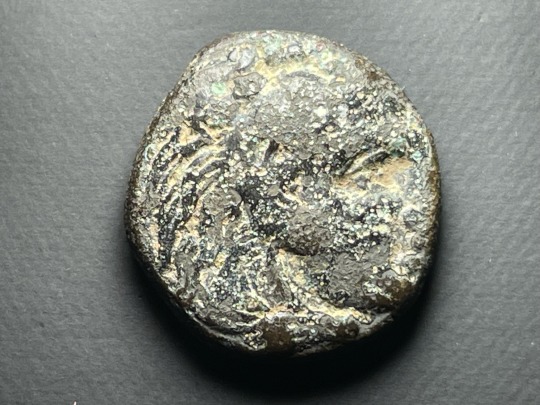
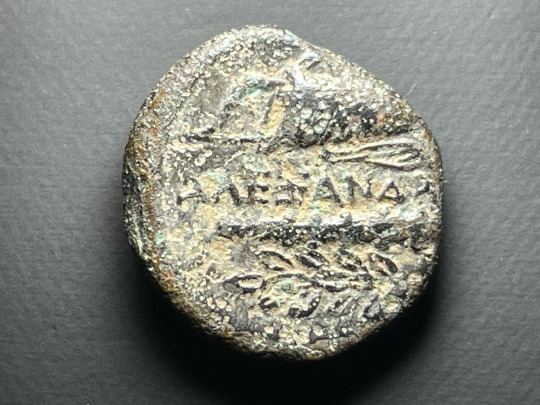
Kingdom of Macedon
AE16 - 3.67g
Alexander III 336-316 BC
Kourion Mint
Obverse Head of Hercules right, wearing lionskin
Reverse ΑΛΕΞΑΝΔΡΟΥ
Bowcase above, club and branch below
Price 3113
#Coin of the Day#Kingdom of Macedon#Macedon#Macedonia#Alexander III of Macedon#Alexander III#Alexander the Great#Ancient Greece#Greek coins#coin#coins#numismatics#ancient coins
6 notes
·
View notes
Text
incredibly petty pet peeve i have is when writers recycle names from ancient or medieval civilizations for their fantasy kingdoms w no regard to if the cultural inspirations even match up. it's like an unspoken assumption that if they've never heard of these names before yoinking them from wikipedia then surely no one else has. such flat and disappointing worldbuilding
#''navarre'' used for a kingdom that is otherwise full of gaelic and celtic names when the historical navarre was fucking spanish#''illyria'' dropped into what is essentially fantasy britain when surprise surprise the historical illyria was in the balkans#im p sure i even saw another series using ''massedonia'' as an invented name#WAS IT EVEN A **LITTLE** CULTURALLY INSPIRED BY ANCIENT MACEDONIA??? NO!!!!!!!!#FUCK!!!!!!#textphelia
6 notes
·
View notes
Photo

Herakleia Lynkestis
Herakleia Lynkestis (Heraclea Lyncestis; Ἡράκλεια Λυγκηστίς) was a city in the ancient kingdom of Macedon not far from modern Bitola, founded c. 358 BCE by Philip II of Macedon (r. 359-336 BCE) as a governing centre for his new expansions around the older capital, Aigai, east of his current capital, Pella, to secure his western border from further Illyrian invasions.
Although Philip chose the location for strategic reasons, his decision may have been influenced by his mother, Queen Eurydice I of Macedon (c. 410-369 BCE), being originally from the family ruling the Lynkestian tribe. Philip named the new city after the legendary hero Herakles (Hercules), not least because his family of Macedonian rulers, the Argeads, claimed this son of Zeus was their founding father. Herakleia Lynkestis was first built as a defensive citadel. Later developments may not have added much to its expansion but they turned the city into a significant centre of trade and administration.
After the Roman conquest of the Greek world in 146 BCE, Herakleia Lynkestis became a centre for local magistrates, perhaps reflecting the legacy of its most notable figure, Queen Eurydice (whose name means "sound judgment"), and the public reverence for Nemesis, the goddess associated with exacting justice. Thanks to its advantageous location along the so-called Roman highway of the Balkans, Via Egnatia, the city became a popular hub hosting visitors, traders, travelers, and scholars, who were drawn to its vibrant forum, temples (later basilicas), palaces, and theatre.
Via Egnatia, 146 BCE to c. 1200 CE
Nathalie Choubineh (CC BY-NC-SA)
Lynkestis
Lynkestis, meaning "the place of lynx(es)", was a region east of Lake Prespa in Upper Macedonia, covered with wooded mountains and fertile plains. It was probably named after the earliest tribe attested in written history that inhabited there, the Lynkestai (the Lynkestians). However, it is also possible that the migrant community that finally settled in the region began to call their location by the name of its most common beast, and they were later known by this name.
Archaeology, on the other hand, reveals that the Lynkestis region might have been inhabited long before what ancient writers could tell. The earliest evidence indicating the presence of certain local tribes dates back to the end of the Mycenaean era in the Late Bronze Age, namely c. 1200-1100 BCE. Archaeological finds include pieces of typical Macedonian matt-painted vessels with concentric circles alongside foreign artifacts from distant regions such as Cyprus. This, coupled with Macedonian-style ware found in Boetia, suggests extensive and dynamic trade networks and cultural interactions within the region.
Historical records about the Lynkestians are sparse, and the existing pieces suggest that their community proper, under a verifiable basileus (monarch), began to form no earlier than the mid-7th century BCE. According to the 1st-century BCE Greek geographer Strabo, the local tribes of Upper Macedonia were often ruled by foreigners, who, in the case of the Lynkestians, were descendants of a Corinthian clan, the Bacchiads (7.7.8). They took their name from Bacchis (r. 926-891 BCE), a later successor of Aletes, who was the last Dorian king of Corinth (overthrown in 1074 BCE). The Bacchiads continued to rule Corinth until 784 BCE, when their final king, Telestes, was assassinated by two members of a different Bacchiad faction, Arieus and Perantas (Herodotus 5.92; Pausanias 2.4). Following this regicide, Corinth adopted an oligarchic system of government led by the prytaneis (executive authorities), a polemarchos (commander-in-chief), and a council of elders.
Bronze Figurine of Infant Hercules Killing Serpents
Nathalie Choubineh (CC BY-NC-SA)
Politically, the rule of a minority group rarely receives positive commentary in ancient texts, and the oligarchy of the Bacchiads is no exception. Herodotus (5.92B) describes the Bacchiads as harsh and autocratic, for example, restricted to marrying within their own clan. However, one of their women, Labda, was born with crooked legs and could not find a husband among the Bacchiads. She was eventually given to an outsider from Petra, although this was likely a different city from the famous one in modern-day Jordan. When Labda gave birth to a son, the Oracle at Delphi prophesied that he would become a great leader. Fearing this, the Bacchiads sought to kill the child. Nevertheless, he survived when his mother hid him in her private chest, from which he got his name, Cypselus, meaning the "chest" or "box". In 655 BCE, Cypselus successfully overthrew the Bacchiad oligarchy and expelled them from Corinth. The exiled Bacchiads moved to Corcyra (modern-day Corfu), and some chose to travel further, eventually becoming rulers of the Lynkestian tribe in Upper Macedonia.
Continue reading...
38 notes
·
View notes
Text
Heritage News of the Week
Discoveries!
A recently unearthed altar in Tikal holds the burial of a child and adult, but it wasn't built by the Maya. Instead, it appears foreigners from Teotihuacan built it.
North Macedonian ruins could be the lost capital of the Kingdom of Lyncestis
Archaeologists excavating at Gradishte, an archaeological site in the Bitola Municipality of North Macedonia, believe they may have uncovered the remains of Lyncus, the lost capital city of the ancient Kingdom of Lyncestis.
'Major' ancient Egyptian town discovered
Archaeologists in Egypt have uncovered the remains of a "major" 3,400-year-old town dating to the New Kingdom that was possibly built by King Tutankhamun's father and later added to by Ramesses II, a new study finds.
Fragments of masterpiece tomb of Renaissance-era Spanish duke were found in the garbage dump
In 1904, the Convent of San Francisco in Cuéllar, Spain collapsed. Under the rubble lay the alabaster funerary complex commissioned by Beltrán de la Cueva, the powerful first Duke of Alburquerque. While two intact tombs from the complex were sold to New York’s Hispanic Society, the rest of the ensemble vanished into thin air. Or so it seemed.
Study unveils secrets of Norway’s second largest man-made mound
Jellhaug, also referred to as Jellhaugen, is the second largest mound in Norway and ranks among the most substantial ancient earthworks in the Nordic region.
The only ancient Greek theatre on the Ionian Islands is finally unearthed
More than a century after its initial discovery, the only known amphitheater on the Ionian Islands is finally seeing the light of day.
Copper cymbals sheds light on shared musical traditions
Archaeologists have examined a pair of copper cymbals from Bronze Age Oman, shedding light on a shared musical tradition that connected cultures and supported trade across the Arabian Gulf.
A student had a hunch about a stone circle. Turns out a 3,700-Year-old ritual site was beneath it
A six-foot-tall standing ceremonial stone in a Derbyshire forest had one archaeology enthusiast searching for more.
Researchers examine 4,000 bricks to solve the secrets of an ancient Roman metropolis of Trier
Trier, once a significant economic and political center in the northern provinces of the Roman Empire, is set to be the focus of a new research project funded by the German Research Foundation.
Earthquake reveals Myanmar’s hidden monuments
According to local reports near Tada-U, a town in central Myanmar about 10 km from the provincial capital of Mandalay, substantial ruins have appeared that archaeologists believe could be the remains of a “water palace” from the Konbaung Dynasty era.
'Hairy books' bound by medieval monks are covered in sealskin, study finds
A scientific analysis of dozens of 12th- and 13th-century books found in European monasteries reveals they were bound in sealskins procured by Norse traders from as far away as Greenland.
Ritual offerings deposited by extinct civilisation discovered in Mexican cave
A mapping project of Tlayócoc Cave, located in the mountains of Guerrero, Mexico, has led to the discovery of ritual offerings deposited by an extinct group of the Tlacotepehua people.
Thriving local settlement uncovered near Roman legionary camp
Several farmsteads have now been identified and archaeologists have recovered artifacts demonstrating that local communities interacted and traded with the Roman soldiers.
Archaeologists uncover unique 6th century mosaic in abandoned Byzantine monastery
A recent excavation report from the Israel Antiquities Authority has revealed the discovery of a well-preserved Byzantine-period monastery and farmhouse in Naḥal Peḥar, located within the modern settlement of Giv‘ot Bar, north of Beersheba.
Ancient jawbone from Taiwan belongs to a mysterious group of human ancestors, scientists say
An ancient jawbone discovered in Taiwan belonged to an enigmatic group of early human ancestors called Denisovans.
Elite Celtic warrior had healed arrowhead injury in his pelvis, 3D bone analysis reveals
A Celtic warrior was injured in battle 2,500 years ago. Archaeologists were able to identify the weapon based on 3D scans of his skeleton.
Dacian treasure hoard discovered by detectorists
A pair of detectorists conducting a survey near the town of Breaza have discovered a major treasure hoard associated with the Dacian people.
6,500-year-old hunting weapons found in Texas cave are among the oldest known in North America
Archaeologists in Texas have discovered a cache of ancient hunting weapons, including the remains of poison darts, that is one the earliest collections of hunting weapons ever found in North America.
Buddha statue discovery in North Korea
The Buddha statue found at Yakjon-ri measures 1.7 metres in height and depicts Amitābha, one of the principal Buddhas in Mahayana Buddhism and the most revered figure in East Asian Buddhist traditions.
Grave of Chuquibamba culture heroes excavated in Peru
At the site of El Curaca, the team uncovered a cemetery of the Chuquibamba culture (ca. a.d. 1000–1450) consisting of collective tombs arranged in circular pits with stone-lined walls. One grave contained the remains of 24 men, women, and children who had been interred with an elaborate collection of funerary offerings.
New research links climate crisis to the fall of the Roman Empire
A study led by scientists at the University of Southampton, in collaboration with Queen’s University Canada and the Chinese Academy of Sciences, has unveiled new evidence regarding the Late Antique Little Ice Age—a significant climate crisis in the 6th century that may have contributed to the fall of the Roman Empire.
4,000-year-old burial of elite woman with ostrich fan reveals world's oldest known evidence of head straps
Marks on 4,000-year-old skeletons reveal that Bronze Age women in Nubia were carrying goods and young children on their heads using tumplines, a type of head strap that can hold a basket, a new study finds.
More than a century on from its sinking, the last surviving eyewitness to the Titanic disaster is the ship herself—and she has plenty of stories left to tell. Uncovering these stories was the mission of Romeo and Juliet, a pair of remote-operated robots which over three weeks in 2022 descended 12,500 feet to capture the Titanic on the North Atlantic ocean floor. It’s the largest underwater scanning project ever attempted, comprising 715,000 still images and hours of 4K footage, equivalent to 1.5 million MP3 songs in terabyte data. The result is a full-sized 3D replica of the Titanic whose level of detail is allowing researchers to glean new insights on the ship’s final moments.
This is very cool. I'm not going to look at it, because I'm weirdly phobic about the wreck, but it is very cool.
Museums
In the latest legal challenge to the Trump administration from the cultural sector, the largest union of museum and library professionals in the United States has sued to block efforts to eliminate the Institute of Museum and Library Services.
Japanese American National Museum stands up for DEI
The institution said it would continue to embrace diversity, equity, and inclusion in the face of widespread government funding cuts and pressures.
Which US will tourists find when they visit?
Recent changes by the Trump administration are affecting how US museums and institutions tell the nation's multicultural history to travellers.
The boys of Corfe Castle: museum documents life of 1900s gay couple
In Corfe Village, a collection of letters, photos, paintings and diaries that tell the story of a lifelong couple has been digitised in the United Kingdom. These documents tell us of David Brynley (1902-1981) and Norman Notley (1890-1980), a gay couple that lived together for many years.
First known letter from King James to go on display
The first known letter written by King James VI of Scotland - penned when he was no more than seven years old - is to go on display later this month. The rare document - held by National Records of Scotland - joins other items as part of an exhibition to mark 400 years since the his death.
Indigenous Australian shell dolls let out for children’s play at UK museum
Twelve dadikwakwa-kwa given to Manchester Museum on condition they are not permanently kept behind glass
Mutter Museum’s ‘polarizing’ executive director Kate Quinn is out
Kate Quinn is no longer the executive director of the Mütter Museum in Philadelphia. The institution’s leadership confirmed to WHYY this week that Quinn’s final day was April 7.
After the fire: starting over in Telegraph Cove
A popular whale interpretive centre burned down. Now, it’s time to rebuild.
How Bergen-Belsen, where Anne Frank died, was different from every other Nazi concentration camp
A new exhibition at the Wiener Holocaust Library in London chronicles the German camp complex’s history, from its origins housing prisoners of war to its afterlife holding displaced persons
Repatriation
France will repatriate the skulls of King Toera and two Sakalava warriors to Madagascar, marking the first return of human remains under a new French law passed in 2023. The remains, which were taken during France’s colonization of the island in 1897, have been held for more than a century in Paris’s Natural History Museum.
Heritage at risk
Grants from the Institute of Museum and Library Services were slashed overnight as Trump and the Elon Musk-led Department of Government Efficiency continue their decimation of federal arts and culture funding in the United States. According to AFGE Local 3403, the union representing workers at IMLS and other federal agencies, “terminations are estimated to number well over a thousand.”
Delaware Museum of Nature and Science: preserving the past, protecting the future — but facing new challenges
"In 2024, we were awarded a federal grant from the Institute of Museum and Library Services to support the long-term preservation of this songbird egg collection. The project was intended to provide funding to purchase archival, acid-free boxes and hire an intern to help rehouse the eggs. Unfortunately, this week we learned that our grant — along with many others across the country — was canceled. This decision was part of a broader action impacting IMLS and many museums and libraries nationwide. We had already purchased the boxes, which are now in production, and were awaiting reimbursement as promised by the terms of the grant.While this is a setback, our commitment to caring for our collections has not changed. Preserving these eggs remains a priority for us, and we are exploring how to move this important work forward."
Trump will use culture grant funds to build “American Heroes” park
After abruptly terminating critical grants to libraries, museums, and archives across the country last week, the National Endowment for the Humanities intends to redirect some of its funds to construct President Donald Trump’s bizarre “National Garden of American Heroes.”
So thousands of libraries and museums are losing their funding so Trump can build his tacky little statue park.
Harriet Tubman erased from US Parks website without agency’s permission
A text about the Underground Railroad has been restored after it was edited to remove Tubman and downplay the contributions of Black abolitionists.
Odds and ends
Between 23 and 25 October 2024, about 80 scholars from five continents gathered at the McDonald Institute for Archaeological Research at the University of Cambridge in the UK for the ‘Envisioning Decolonial Futures Through Archaeology’ conference. The conference facilitated interaction between a great variety of perspectives on what it means to decolonise archaeology and how our discipline can help shape decolonial futures.
Famine graves set to be publicly marked
The unmarked graves of thousands of people who died during the Irish famine in Belfast are finally set to be officially marked.
The US's 2000-year-old mystery mounds
Constructed by a mysterious civilisation that left no written records, the massive site is now open to the public for the first time in more than a century.
10 Downing Street VE Day Bunting competition
As part of the 80th Anniversary celebrations of Victory in Europe (VE) Day, we are inviting schools and young people across the country to take part in a special creative competition to design bunting for 10 Downing Street.
I really love how much Britain loves bunting.
#put up more bunting#for example: america: I can think of a reason in the hopfully not-too-distant future where you can celebrate with bunting#put up *all* the bunting for that#history#archaeology#museums#titanic#it's good there is now a digital copy of the wreck because it is disintegrating fast#heritage news of the week
25 notes
·
View notes
Text
Sike
Initial info snippet: Βεργίνα (or Vergina in English) is pronounced ver - YEE - nah. Just saying, for no particular reason whatsoever.
Perhaps you know that there is a country in the periphery of Greece that has a flag with a sun. This alongside other issues has been a cause of contention between Greece and this country, as it using this sun as a symbol of its non-Greek nationality was condemned by Greece as an act of cultural appropriation.
That sun looked suspiciously like (as in, it was identical down to the last line) to the Vergina Sun, or sometimes called Vergina Star, most famously discovered in the tomb of King Philip || of Macedon, in Ancient Aegae, Vergina, Macedonia, Greece.

The golden larnax with the Vergina Sun found in the tomb that is believed to be King Philip's.
For some time the Vergina Sun was mostly perceived as a symbol of Macedonia or Macedonian royalty, except that meant polar opposite things to Greeks versus to their neighbours. The Vergina Sun became the symbol of the administrative and historical region of Macedonia within the Greek state, which has this local flag:

The flag was first created in the late 80s after archaeologist Michael Andronikos made the huge discovery of the tombs in Vergina. The Vergina Sun was added as a national symbol at the Hellenic Parliament in 1993.
Meanwhile, in 1992 the newly founded neighbour state (risen through the collapse of Yugoslavia) adopted the EXACT same flag as their official national flag, except the background was changed to red. Greece condemned the use of this symbol, accusing the country of appropriation. Due to the rising tensions between the states, the neighbouring country eventually changed its flag.............. which means it's still the same red flag with the sun except now the sun is "designed differently". Of course, the implications behind it as well as the claims have not changed one bit. The neighbour country was mad at Greece for preventing them to express their true ethnicity and for using her immense evil power (which, as we all know, Greece definitely possesses) to steal THEIR history, because Greece is jealous of THEIR history. Anyway even though there was a legal agreement of sorts between the countries in the last years, it is honoured so little you might as well believe it was never done. And it is crap for our side as well, so everybody hates it.
But here's the funny thing. Even if one argues the true issue is what being a Macedonian entails (which shouldn't truly be a discourse but let's pretend it is)... the hilarious truth is that the Vergina Sun..... is actually not a symbol of Macedonia and Macedonians.
You see, the symbol has been discovered all throughout Greece since at least the 6th century BCE, way before the Kingdom of Macedon rose to any prominence.

Vergina Sun originating from… Sparta, 6th century BC, exhibited in the Louvre.

This famous amphora by Exekias, 6th century BC, depicting Achilleus and Ajax playing a board game. The Vergina Sun decorates their cloaks. Exhibit in the Vatican Museum.

Hercules fighting the Amazons. The Amazon bears a shield with the Vergina Sun. Early 5th century, Gela, Italy. (So it was crafted in the Greek colonies in Magna Grecia, South Italy.) Exhibited in the Regional Archaeological Museum "Antonio Salinas", Palermo.

Jar with the Judgement of Paris. Athena's shield is decorated with a Vergina Sun. Athens, c. 360 BC.
So you know, not only it wasn't an exclusively Macedonian symbol but it actually seems to have been an Archaic symbol of Panhellenic (encompassing all the Greeks) warfare.
Dem evil Griekos stealing other pipl's history.
52 notes
·
View notes
Text
Here's an uncomfortable truth too: all modern nation states engage with little white lies about their history and founding. Israel has certainly done it, and yes there is an element of mythologizing of the past. It just sounds good, even legitimate, to claim an unbroken descent from 4,000 years ago. It's not entirely literally true on the face of it. Yeah, the ancient Israelites would probably have no idea what a modern Jew is talking about when it comes to worship and law and even holidays. It's clear these aren't the exact same carbon copies of each other. The Jewish People have evolved and changed, been influenced, consciously reorganized their culture and religion at times... disagreed with each other.
But why is Israel, or more broadly why is the Jewish People, the only nation held to some kind of standard like this? Why is it a proud tradition to pull the rug out from under them and say "Haha your foundational beliefs about the origins of your People aren't literal! Wow how pathetic, you think you have a right to this land because people you claim were your ancestors lived there a bajillion years ago? YAWN!"
Egypt proudly commodifies the cultural artifacts and practices of the Ancient Egyptian dynasties, even though the culture that built the pyramids has, iirc, has been dead longer than it was ever alive at this point. Even though the different Kingdom Periods were staunchly different from each other and had little continuity with each other. Greece claims a legacy from all sorts of myths and heroes and especially Alexander the Great (so does Northern Macedonia lmao). But Greek Nationhood was achieved in 1820, and Greeks as a modern ethnic group have a medley of cultural influences from the Romans and Slavs and Turks and many others. They considered themselves Roman Citizens well into the Ottoman Period. They are not the same People as the people who recited the Odyssey and wrote the Hymn to Demeter. I could go on.
Both modern Egyptians and modern Greeks have a better claim to their respective cultural legacies than any other extant group to be sure (largely because they built their nations in the same approximate lands as these ancient civilizations), but that reinforces my point.
The issue when it comes to Jews is that there are pretenders who were eager to swoop in and claim the legacy of the ancient Israelites (and later the Kingdom of Judea) for their own. There were people living on that specific land who weren't keen to just give it up, even though any amount of Jewish people immigrating through every legal channel was seen as an existential invasion (funny that).
Christian peoples did it eagerly and often, Muslims less so, but still did it happily. This ultimately culminates in a certain brand of Palestinian nationalism that claims (deludedly) that Palestinian Arabs are responsible for all those ancient site and cities, that they built a Temple, they were the specific nation that engaged in all those stories from the Bible. Jesus was a Palestinian (not really appropriating Jewish history with that one to be fair, but it's adjacent). All simply because they happened to live on that land. Jewish immigration was not just an economic threat (which had a lot of credibility), but a nation-building threat for that reason.
I think it's a lot harder for Jews to claim their own National Legacy because so many other groups of people want it for themselves. As I've always observed, a foundational cornerstone of antisemitism is envy and resentment. So many other peoples envy Jews their apparent "chosen status," and their continued success even after suffering tragedy upon tragedy. They resent Jews for still being here and still having a credible claim on the cultural legacy they want for themselves.
Many people are mad that Jews simply didn't die out like so many other ancient civilizations. Or they're mad that Jews simply didn't assimilate into whatever power structure is relevant, Empire, Church, Ummah, Nation-State, what have you. That Jews continued to exist and eventually got the chance to repatriate millions of themselves in their historic homeland so they could engage in the same process of nation-state building that every other country has engaged in pisses them off so much. That's not something inferior people should be allowed to do!
I think that's why many Palestinians still largely refuse to recognize the legitimacy of a Jewish state. They refuse to contend with the fact that a huge percentage of their ancestors were recent immigrants to the region just like the Jews. Tens of thousands immigrated from Egypt and Syria for economic opportunity at the turn of the century, largely thanks to Jewish capital being invested in the land. They refuse to recognize that previous Jewish states have always had large non-Jewish minorities who had explicit legal rights (try reading the Talmud for real instead of just plucking out square quotes about "they think goyim are animals!")
I think peace and coexistence are achievable. But it's a two-way street. There are Jewish supremacists who are overly literal about the legacy of the Jewish People and think they have exclusive eternal right to the land and anyone who gets in their way should be violently removed. But there are also still Arab supremacists who refuse to accept any semblance of Jewish Nationhood. The reality is that contemporary Jewish Nationhood has been here for over a century, maybe more. It can't be ignored or wished away, and violence has still not worked.
29 notes
·
View notes
Text
Zagreus Sabazius
Important reminder. Everything I write about here is only indirectly connected by distant assumptions and rare crossings and absolutely should not be considered the immutable truth. As someone whose patron is Zagreus, I write about my findings and assumptions, but I am also totally possibly to be mistaken and see what I want to see myself. Take everything with a grain of salt.
We have already once looked at the Greek sources with the story of Zagreus. But beyond the rare surviving Greek sources, we will always have something else. Why is Zagreus sometimes mentioned with the epithet “Sabazius”? What does this epithet mean? What are Zagreus' powers? And why, after all, is he and Gaia called “highest of the all gods” in the Alcmeonis?
Welcome to my deep dive on one of the most mysterious theoi — Zagreus Sabazius.

So, later Greek writers, like Strabo in the first century CE, linked Sabazios with Zagreus. But who is Sabazios and what does it mean?
Sabazius comes from a common root with Sanskrit sabhâdj, honored, and with Greek σέβειν, to honor. It's also may be connected with the Indo-European *swo-, meaning "[his] own," and with the idea of freedom.
Sabazios is a deity originating in Asia Minor. He is the chief sky god of the Phrygians and Thracians. Sabazios gained prominence across the Roman Empire, particularly favored in the Central Balkans due to Thracian influence. On some monuments Sabazius is called “master of the cosmos”.

Decree of the organisation of worshippers of Sabazius, 102 BC
It seems likely that the migrating Phrygians brought Sabazios with them when they settled in Anatolia in the early first millennium BCE, and that the god's origins are to be looked for in Macedonia and Thrace. The ancient sanctuary of Perperikon in modern-day Bulgaria, uncovered in 2000, is believed to be that of Sabazios.


Two altars in the sanctuary were used for blood sacrifice.

And as Euripides has already graciously told us, Zagreus was honored as a god of blood, among other things. Sabazius, as a deity, was often associated with sky, thunder, nature, boons, mystery, and blood. One of its most frequent symbols was serpent.
Sabazius' references sometimes included Cybele. She is an Anatolian mother goddess. She is Phrygia's only known goddess, and was probably its national deity. Greek colonists in Asia Minor adopted and adapted her Phrygian cult and spread it to mainland Greece and to the more distant western Greek colonies around the 6th century BC.
In Greece, Cybele met with a mixed reception. She became partially assimilated to aspects of the Earth-goddess Gaia, of her possibly Minoan equivalent Rhea, and of the harvest–mother goddess Demeter.
And now everything suddenly made sense. Why are Gaia and Zagreus named the highest of all the gods in Alcmeonis? Because they always have been.

In her transition to Greece, Cybele, Phrygia's only known goddess, was named Gaia (which honestly makes much more sense to me than associating her with Rhea or Demeter). And Zagreus? And Zagreus remained Zagreus.
Gaia Cybele and Zagreus Sabazius, Mother Earth and Sky King, the highest gods of the Phrygians and Thracians, who later also made their way to Greece.
But unfortunately, no individual direct myths about King Sabazius have survived either.
But there was also one thing that persisted and always baffled me.
In my personal experience with Zagreus, his signature weapon has always been moonblades to me. And I always wondered why. What does Zagreus have to do with the moon? Why is it always an integral part of his power and history in my experience?
Well, now I know the answer.
At one point Sabazius merged with the Asia Minor and Syrian moon deity, Mēn. Mēn was a lunar god worshipped in the western interior parts of Anatolia. He is attested in various localized variants, such as Mēn Askaenos in Antioch in Pisidia, or Mēn Pharnakou at Ameria in Pontus.

Bust of Mēn in Museum of Anatolian Civilizations
In the Kingdom of Pontus, there was a temple estate dedicated to Mēn Pharnakou and Selene at Ameria, near Cabira (Strabo 12.3.31). The temple was probably established by Pharnakes I in the 2nd century BC, apparently in an attempt to counterbalance the influence of the Moon goddess Ma of Comana. The cult of Mēn Pharnakou in Pontus has been traced to the appearance of the star and crescent motif on Pontic coins at the time.
A similar temple estate dedicated to Mēn Askaenos existed in Pisidia, first centered around Anabura and then shifted to the nearby city of Pisidian Antioch after its founding by the Seleucids around 280 BC. The temple estate/sacred sanctuary (ἱερόs) was a theocratic monarchy ruled by the "Priest of Priests," a hereditary title. According to Strabo, this "temple state" that the cult of Mên Askaenos controlled near Pisidian Antioch, persisted until the city was refounded by the Romans in 25 BC, becoming Colonia Caesarea Augusta.
The Augustan History has the Roman emperor Caracalla (r. 198–217) venerate Lunus at Carrhae; this, i.e. a masculine variant of Luna, "Moon", has been taken as a Latinized name for Mēn.
Even though no specific myths have survived about any aspect of Zagreus, it gives us a wealth of information about what Zagreus was and is and the diverse number of domains he holds.
Yes, Zagreus. Zagreus, god of mysteries, blood, flesh, sky, thunder, nature and moon. Zagreus Sabazius, Zagreus Mēn, Zagreus the Winged Serpent Hunter, Zagreus the Scarlet Thunderer, Zagreus the Serpent King. Zagreus Prince of Chthonia, Zagreus King of Sky, Zagreus Highest of All the Gods, Zagreus Master of the Cosmos.
Ζαγρεύς Σαβάζιος
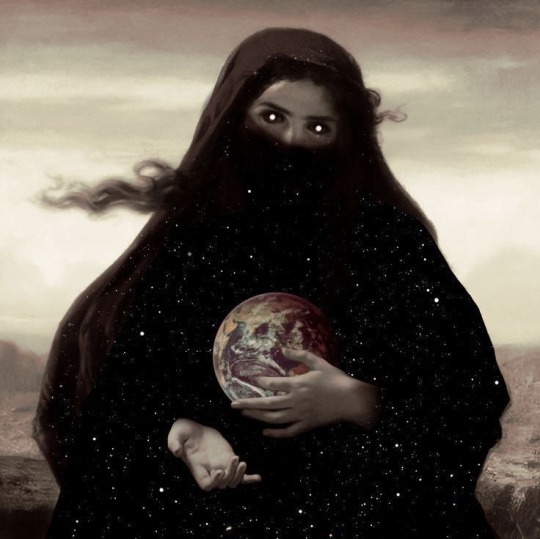
#zagreus#zagreus deity#zagreus sabazius#Zagreus Mēn#Ζαγρεύς#Ζαγρεύς Σαβάζιος#Ζαγτεύς Μήν#greek mythology#greek gods#hellenic polytheism#hellenism#greek myth#greek pantheon#hellenic gods#theoi#sabazios#Mēn#hellenic deities#helpol#greek history#ancient greek#ancient greece#ancient greek mythology#ancient greek gods#ancient greek religion#ancient history#mythology#as you can see I'm still in dire need of psychiatric help
36 notes
·
View notes
Note
Sorry if my question was uncomfortable, but I'm a foreigner and would like to understand more about the "feud" between Greece and North Macedonia. I've seen (heated) discussions between Greeks and Macedonians about culture, but I don't know much about the context. Again, sorry if the question is uncomfortable or insensitive.
I think this Geography Now! video does a good job of explaining the controversy. Basically, the Greek position is that since Slavs came a thousand years after Alexander in the area, and the culture and language of North Macedonians are largely Slavic it's illogical for them to name their country after a Hellenistic kingdom and claim many Greek figures, and also Alexander the Great, as people from their culture.
For clarification, Alexander the Great was certainly Greek and he spoke the Macedonian dialect of Greek which was Doric (for reference the Spartans also spoke the Doric dialect). When North Macedonians say "he was Macedonian" they mean he was from their culture and he spoke their language, and he wasn't Greek.
North Macedonian history tends to confuse the administrative regions with culture and ethnicity because it's convenient to them. It doesn't matter if Kyrillos and Methodios were two Greek brothers from Thessaloniki. To N. Macedonians, because these two brothers were in a region that was occasionally the administrative region of Macedonia, they were "Macedonians", hence "from North Macedonia". To them it doesn't matter that Alexander's birthplace and all important cities of the Hellenistic Macedonian Kingdom are in Greece.
What is crucial to understand about this controversy is that Macedonia for a long, long time, was basically "a geographical region of many mountains". The Greek word Μακεδονία literally means "Mountainous Region", and because it's kind of a distinct region it was a district on its own many times. That's an approximation of the limits of "Macedonia" as a geographical region with distinct characteristics.
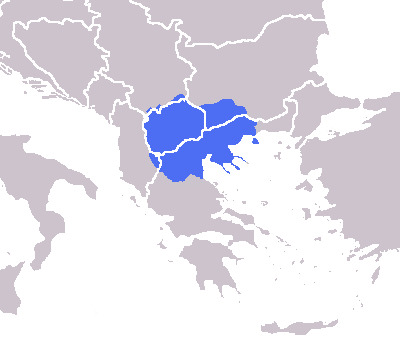
Below is the ancient Greek kingdom of Macedonia. However, the people who are now residents of N. Macedonia won't be here for another thousand years!
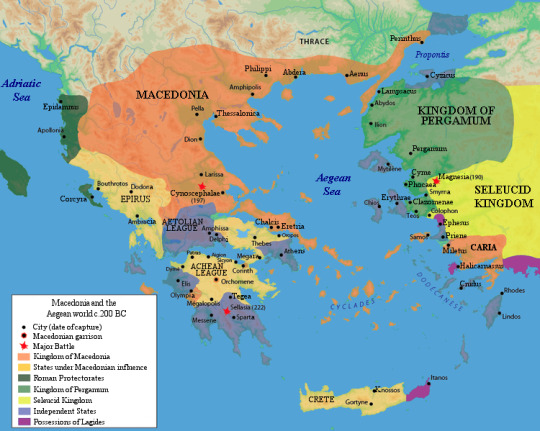
The guy in the video says the Macedonian kingdom expanded, but then he doesn't say that it was separated into more kingdoms for better governance, and one of those kingdoms was this controversial region (in Green) which is now part of Greece and North Macedonia. (Slavs were still not in the area)

When Romans conquered these kingdoms they also separated the area into administrative regions. The province of Macedonia within the Roman Empire, circa 125 (Slavs were still not in the area):
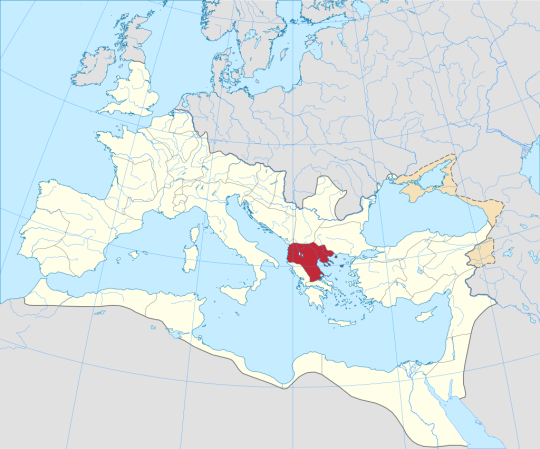
Later administrative departments of Roman empire (Slavs were still not in the area). In fact, "Provincia Macedoniae" changed almost at the time the Slavs arrived, in the 7th century.
Within the Eastern Roman Empire there was later separation into Themata, but now the department of Macedonia was moved to the West, occasionally including parts of the region where N. Macedonia is today. (Slavs in the area after 7th c. ACE)
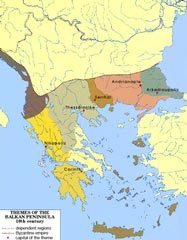
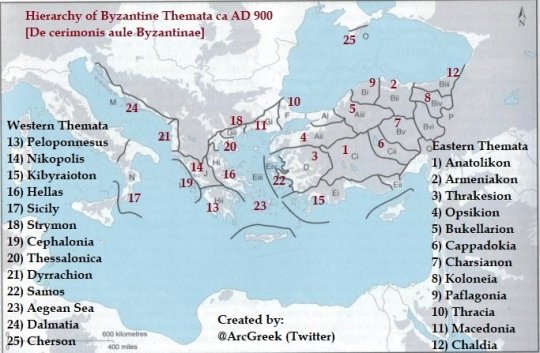

Theeeen came the Turks, and separated the regions differently. Now everyone, Turks, Greeks, Slavs, Hebrews and whoever else lived in that region, are all part of the same "millet", the Rum Millet. "Macedonia" wasn't an administrative area then.
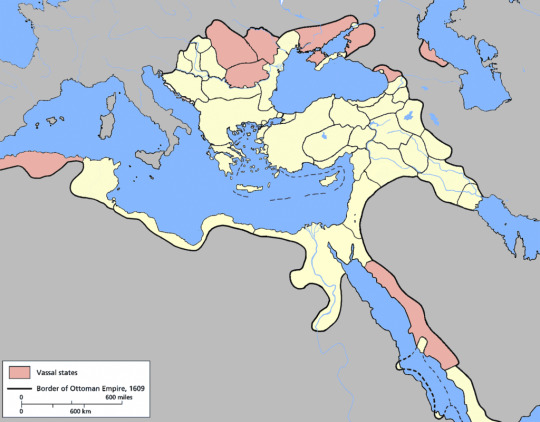
In the 19th century, Turks and Slavs were the majority in the region of Macedonia, with Greeks coming third population-wise, and Hebrews also having very large communities.
(Greeks might not like this fact, or they may ignore it completely, but if you open actual historical books and maps, you'll see the demographics. We have censuses from that era. I learned the old Slavic and Turkic names that villages and places in my region had. There's also a reason Kemal Ataturk's mother wrote to him "They took our Salonik" when Greeks reclaimed the city after 600 years. We can still love our country and appreciate our history, without erasing parts of it.)
In 1912, the largest part of the region of Macedonia was claimed by Greeks. In time more Greeks came to it as immigrants from Anatolia and other Greek regions, shifting the population in such a way that Greeks were now the majority. (North Macedonia still doesn't exist as a country)
In 1991, when the country of North Macedonia was created, Greece already had an administrative region of Macedonia which covered most of the Macedonian geographical area, also the ancient Greek cities of the kingdom, and the emblem of Greek Macedonia was the ancient Greek Macedonian star. The Vergina Star, and the ancient Greek city of Vergina is also in Greek ground today. (Our Emblem and Flag)
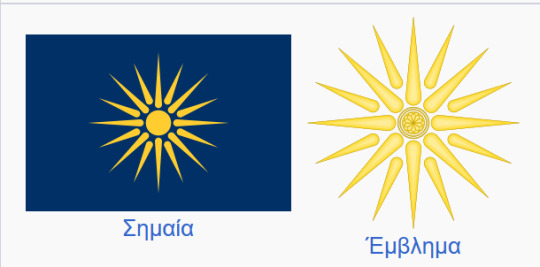
So you can imagine it came as a shock to Greeks when a newly founded country used not only their symbols, but also distinctly Greek symbols. People who are now residents of N. Macedonia lived in the geographical region that a few centuries ago was also "Macedonia" in the administrative sense, so I get where they're coming from. However, when culture gets appropriated, when the culture of important ethnically Greek figures is erased, when Greek words are claimed to be "Macedonian" all of a sudden since 1991, things get tense.
It's a political matter, as the video says. People from the two countries usually have normal interactions if the matter doesn't come up. And I don't think there's hate between the simple people.
#I am not in the mood for a debate I just wanted to explain stuff#make your own post if you want to let off some steam against Greeks :P#answered
67 notes
·
View notes
Text
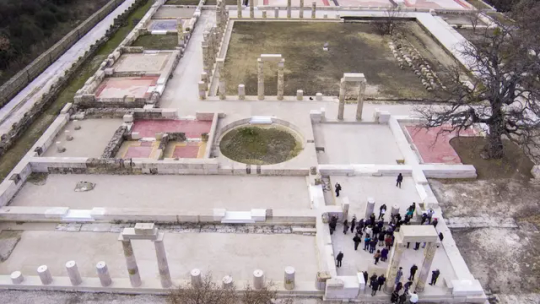
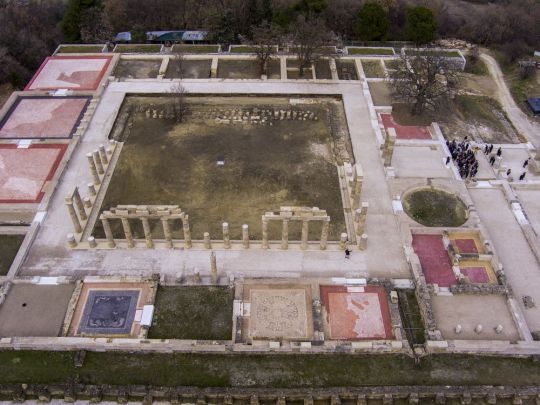
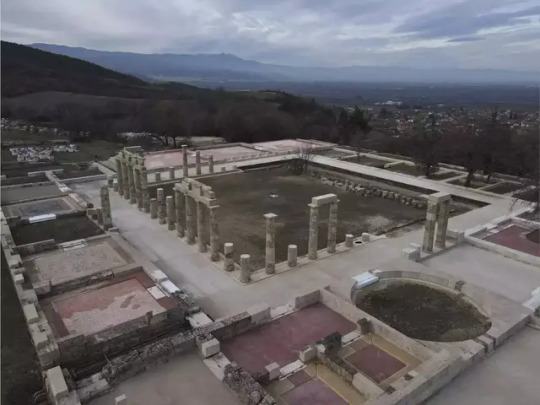
Greece Reopens the 2,400-Year-Old Palace Where Alexander the Great Was Crowned
The 2,300-year-old Palace of Aigai—the largest building in classical Greece—had been under renovation for 16 years.
On the day he was crowned king of Macedonia, Alexander the Great stood atop the intricately patterned marble floors of the Palace of Aigai. This week, the historic palace finally opened to the public after a 16-year-long restoration, report Derek Gatopoulos and Costas Kantouris of the Associated Press (AP).
At 160,000 square feet, the Palace of Aigai was classical Greece’s largest structure. Built primarily by Alexander’s father, Phillip II, in the fourth century B.C.E., it was the home of the Argead dynasty, ancient Macedonia’s ruling family. It was destroyed by the Romans in 148 B.C.E. and endured a subsequent series of lootings. Renovating and excavating this sprawling monument was a serious undertaking, costing over 20 million euros ($22 million).
The Greek government was able to maintain the “general appearance” of the site amid careful alterations to the monument’s towering marble columns, delicate mosaics and textured flooring, according to Xiaofei Xu and Chris Liakos. The palace once featured large column-lined courtyards, worship sites and expansive banquet halls, and its restoration presented a “three-dimensional jigsaw puzzle,” per the AP. Archaeologists solved it by combining stones from the structure’s ruins with replica parts to reproduce the original structures.
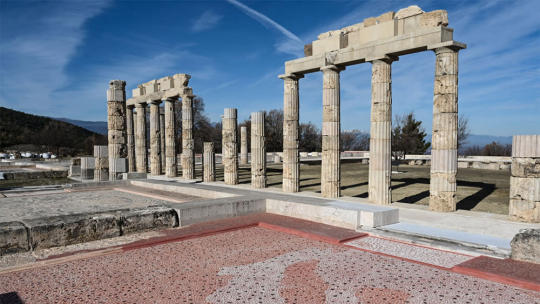
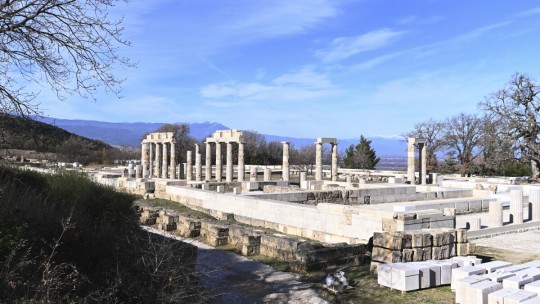
Archaeologist Angeliki Kottaridi started working on the renovation efforts as a university student. Overseeing the project’s progress over many years and contributing to its excavation and reconstruction, Kottardi became a leading figure in the project.
“What you discover is stones scattered in the dirt, and pieces of mosaics here and there,” Kottaridi told state television before an opening ceremony on Friday, per the AP. “Then you have to assemble things, and that’s the real joy of the researcher.”
The Palace of Aigai is located in northern Greece between what are now the towns of Palatitsia and Vergina. Its reopening builds on discoveries made in the late 1970s by Greek archaeologist Manolis Andronikos, who unearthed a cluster of royal Macedonian artifacts, including gold and silver ceremonial weapons and armor, and burials, one of which is thought to contain Phillip’s remains. The palace and its neighboring tombs are now a UNESCO World Heritage site.
Deeming it “among the most important archaeological sites in Europe,” UNESCO writes that the Palace of Aigai “represents an exceptional testimony to a significant development in European civilization, at the transition from the classical city state to the imperial structure of the Hellenistic and Roman periods.”
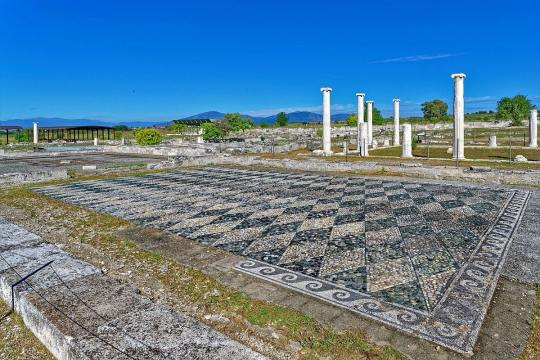
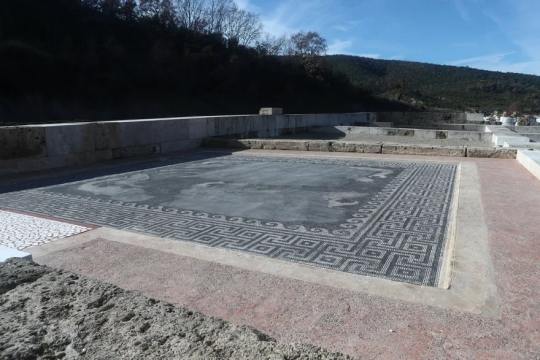
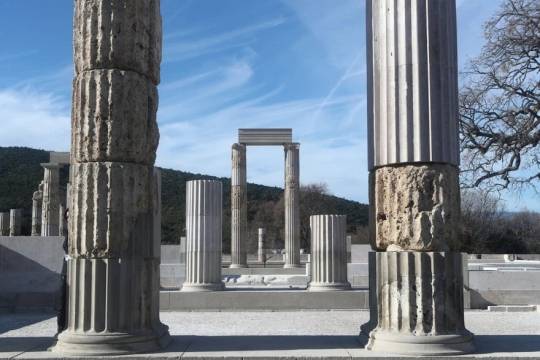
As the site of the first capital of the ancient kingdom of Macedonia, the Palace of Aigai signifies the onset of Alexander’s rule, which would stretch from Asia to the Middle East, and provides a crucial window into Macedonian culture.
“The importance of such monuments transcends local boundaries, becoming property of all humanity,” said Kyriakos Mitsotakis, Greece’s prime minister, at the inauguration event, per CNN. “And we as the custodians of this precious cultural heritage, we must protect it, highlight it, promote it and at the same time expand the horizons revealed by each new facet.”
By Catherine Duncan.
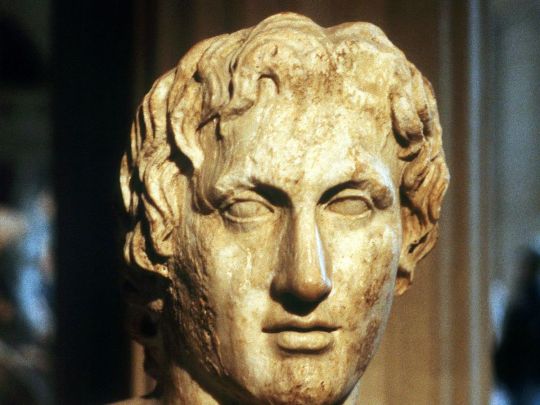
#Greece Reopens the 2400-Year-Old Palace Where Alexander the Great Was Crowned#Palace of Aigai#Argead dynasty#Phillip II#ancient artifacts#archeology#archeolgst#history#history news#ancient history#ancient culture#ancient civilizations#ancient macedonia#ancient greece#greek history#greek art
93 notes
·
View notes
Text
Closing in on Alexander the Great, one ancestor at a time.
9 notes
·
View notes
Note
Hi, Dr. Reames. I was wondering how things would’ve went down if Alexander died and left behind a daughter and no sons. I’m pretty sure she wouldn’t have inherited, though I’m not the expert on the topic, but do you think the successor wars would’ve been different? Or prevented by marrying her off? Though I think that would depend on how old she was since there would still be a gap they’d be without a proper king
What if Alexander had fathered a daughter, not a son?
We can make a good guess at this by comparison to the fate of his sisters, particularly Kleopatra (his full sister, if widowed) and Thessalonike (the unmarried younger sister). They became prime marriage prizes in the Successor Wars (if not during Alexander’s lifetime).
In fact, the sisters would probably have been preferable to a daughter, particularly a daughter by a Persian (e.g., barbarian) wife. They’re also Argeads and don’t have any “barbarian taint.”
More importantly, they’re old enough to have children themselves. Kleopatra had even proven herself fertile and able to successfully give birth, twice. (A bonus as death in childbirth was always a danger.) This is why Kleopatra, despite being a widow, was the prime marriage choice for the discerning, ambitious Diadoch, not just because she was ATG’s full sister. After her death, Thessalonike was next-best, but she was firmly in the clutches of Kassandros and he wasn’t about to let her go.
I expect that any daughter of Alexander would have wound up a bargaining chip for whomever she felt into the grasp of, likely Olympias. Although if there was no son, there would never have been a dual kingship and regency. Arrhidaios would have been king with Hadea Eurydike, granddaughter of Philip and niece of Alexander, as queen. And that means there wouldn’t have been a war between Olympias for Alexander IV and Hadea for Arrhidaios—making it harder for Kassandros to take over as king. Although if Hadea didn’t get pregnant and successfully produce a child, the succession would have been endangered (again). The fact she didn’t get pregnant (historically). despite several years of marriage, makes me wonder if Arrhidaios may have had issues (or she did).
But with a single king, all that means it probably would’ve been a bit longer before the other Successors broke away entirely to found their own kingdoms. I don’t for a minute think they’d not eventually have named themselves kings. They were a good distance from Macedon and Arrhidaios was no Alexander (or Philip, even if he did take that throne name). Kleopatra might have survived to marry one of them, and Thessalonike might not have been forced to marry Kassandros. Olympias would have negotiated for her, and also for any daughter of Alexander. But I expect any daughter would have been married to one of the Successor’s sons, not a Successor himself. They had sisters to entice. But assuming Seleukos still managed to seize Asia/Persia itself, marrying his son Antiochos (by Apama) to Alexander’s daughter (by Roxane) would have been very appealing, I think.
#Asks#Alexander the Great#Alexander the Great what-ifs#Successor Wars#Diadochi#ancient Macedonia#Hellenistic Kingdoms#sisters of Alexander the Great#ancient Greece#Classics#tagamemnon
14 notes
·
View notes
Text
Lynkestis, Macedonia, Greece
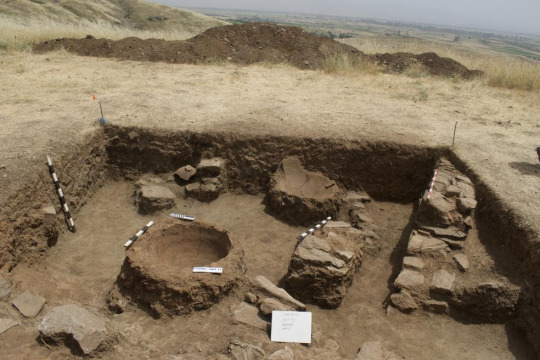
Source: https://now.humboldt.edu/news/humboldt-archaeologists-help-uncover-ancient-city
Originally thought to be a military outpost to protect against invading Roman forces, researchers have found a city in Northern Macedonia that dates back much farther, to the time of Alexander the Great and perhaps even into the Bronze Age. Initially, they thought the site only dated back to King Philip V's reign (221-179 BCE), but they found coins minted between 325-323 BCE, which is during the lifetime of Alexander the Great, and even ceramic vessels and axe fragments that date to the Bronze Age (3300-1200 BCE).

Source: https://now.humboldt.edu/news/humboldt-archaeologists-help-uncover-ancient-city
In addition to the fortifications, researchers have found a Macedonian-style theater and a textile workshop among others, with coins, game pieces, a clay theater ticket, and textile tools being found among the buildings. These findings highlight 'the complex network and power structures of ancient Macedonia, especially given the city's location along trade routes to Constantinople. It's even possible that historical figures like Octavian and Agrippa passed through the area on their way to confront Cleopatra and Mark Antony at the Battle of Actium' one of the researchers said.

By Drawing by Marsyas - Data from M. Hatzopoulos: Macedonian Institutions under the Kings, Athens, 1996., CC BY-SA 3.0, https://commons.wikimedia.org/w/index.php?curid=59915
Additional studies of the area have been done by drone-deployed LIDAR as well as ground penetrating radar, allowing researchers to focus their studies as well as mapping the city. With the location and size, researchers think this city might be the city of Lyncestis, the birthplace of Queen Eurydice I, Alexander the Great's paternal grandmother, who was the center of a plot against her husband Amyntas III. She was one of at least two wives, becoming the dominant one at some point. Her life also marks the first time in Macedonia that the life of a queen or princess was important to the course of politics. She conspired with her son-in-law Ptolemy of Aloros, with whom she was likely having an affair, to kill her husband. Her daughter revealed the plot to Amyntas, though he didn't punish Eurydice. When he died, her eldest son took the throne. He was killed by Ptolemy even though the two had a truce. Ptolemy was forced to agree that he would be regent to Eurydice's other sons rather than rule in his own right. Eurydice later married Ptolemy, though if this was voluntary or not is unclear, though it ensured her remaining son's place in the line of succession. She also persuaded Iphicrates, an Athenian general who was adopted by Amyntas, to protect her sons against Pausanius, who was attempting a coup for the throne of Macedonia. This act was unprecedented act for a royal woman to seek foreign aid to protect the royal line of succession. Her plan was successful, with her second son, Perdiccas III avenging his brother's death and taking the throne, though this act led to Philip II being taken hostage by Thebes. Perdiccas over extended himself against Athens and was killed, leaving Philip II to eventually take control of the kingdom.
7 notes
·
View notes
Text
MACEDONIAN HISTORY
hi. history of all of macedonia, by a macedonian. I will not be calling it north macedonia, im sorry. VERY LONG POST. Im sorry if its messy, i did my best
Before people accuse me, no i dont have anything against greeks or bulgars, frankly idgaf what you are, as long as you dont deny our existance and yes, greeks and bulgars can interact.
@dressuprat hey bud you said you wanna be tagged, im finally done
So, Macedonia has existed for very, very long now.
Macedonia is also the oldest surviving name in Europe! Archaeological evidence shows that old European civilization flourished in Macedonia between 7000 and 3500 BC. In 808-399 BC, Caranus enstablished the first Macedonian kingdom, which was lead by Alexandar I "Phihellene", who fought as a Persian alley in the Greek-Persian wars. His son, Perdiccas II started a conflict between Sparta and Athens, leading to the 27 year Peloponnesian War. Archelaus is who turns Macedonia into an economic power, reorganizing the army. During 359-336 BC, Philip II manages to raise Macedonia into the greatest European power, overcoming all its neighbours (Greeks, Illyrians and Thracians) on August 2nd, 338 BC, defeat the Greeks in The Battle of Chaeronea. This marks an end of Greek history and the start of the Macedonian era. Theopompus, an ancient writer, titles Philip - "the greatest man that Europe had ever given." 336-323 BC, Alexandar III the Great - the son of Philip - carries the Macedonian armies to Asia, conquering Persia and creates the largest Empire (the Macedonian Empire), which stretches from Europe to India and North Africa. 323 BC is the death of Alexandar, which plunges Macedonia into a civil war. By 300 BC, the Macedonian Empire is carved up into the dynasties of Alexandar's generals, aka, Antigonus I, Ptolemy I and Seleucus I.Under Antigonus II Gonatas, Macedonia achieves a stable rule, strenghtening its occupation of Greece. The two "Macedonian wars" which are against the Romans, defeat Philip V's armies, and Macedonia is reduced to its original borders, losing Greece. In 168 BC, the last Macedonian king, Perseus, dies in prison in Italy, after being defeated by Rome in the third "Macedonian war". In 65 BC, the Selecuid Macedonian Kingdom in Asia is conquered by Rome. An end is put to the last Macedonian descendants in Egypt, aswell as the remains of the Macedonian Empire, in 30 BC, when the Romans win over Cleopatra VII.
As of 395, the Roman Empire is split into Western and Eastern. Macedonia falls into Eastern - Byzantine. In 855-886, two Macedonian brothers, Cyril and Methodius, create the first Slavonic alphabet and spread Christianity among the Slavs. Cyril and Methodius' disciples Clement and Naum of Ohrid spread Christianity in the Slavonic language and later establish the first Slavonic Universiy. The first Macedonian Byzantine emporor is Basil I the Macedonian, aka founder of the Macedonian Dynasty. The empre reaches its 'Golden Age' while being ruled by the Macedonian Dynasty (867-1052). The Bogomil teaching, which appeared in the first half of the 10th century and spread through the Balkans and Europe, first appeared in Macedonia. Around 976, the Macedonian Slavs start to rebel against Bulgarian authority, and create a strong Macedonian Medieval Kingdom under Tsar Samoil. The kingdom spreads and Samoil conquers parts of Greece, Bulgaria, Albania, Serbia, Montenegro, Bosnia, Dalmacia and Epirus. It's defeated by Basil II the Macedonian in 1014, and Byzantium takes his empire by 1018. Two major uprisings erupt against the Byzantine rule in Macedonia. Being led by Petar Deljan (1040) and Gjorgji Vojteh (1072). Macedonia remained on Byzantine territory until 1389, when the Ottoman Turks conquered it. In around 1564/65, the first significant Macedonian resistance movement against the Turkish occupation is recorded, known as the Mariovo-Prilep Rebellion. In 1689, the Karposh uprising follows, however the leader (Karposh) is executed on the stone bridge located in Skopje. Under preassure from the Greek Patriarch in Istanbul, in 1767, the Turks abolish the Ohrid Archbishopric, which was what had kept the spiritual soul of the Macedonians alive since the times of Tsar Samoil. In 1822, the Negus uprising erupts, which is an insurrection of the Macedonians for liberation in southern Macedonia.
Greece (1828), Serbia (1830) and Bulgaria (1878) gain independence from the Turkish rule, desplaying territorial aspirations on Macedonian territory, which raises the "Macedonian question" - Serbs, Bulgars and Greeks compete in their quest to occupy Macedonia. In 1878/79, The Macedonians rebel against the Turkish occupation, once again, known as the Krersna Uprising now. The Macedonian freedom fighters adopt a constitution known as the Rules of the Macedonian Uprising Committee. Bishop Theodosius of Skopje begins a campaign for the restoration of the Ohrid Archbishopric (which was, once again, destroyed in 1767) and an independent Macedonian Orthodox Church, in 1891, the Bulgars destroy this. The Internal Macedonian Revolutionary Organization, known as VMRO is founded in 1893. Under the slogan "Macedonia belongs to the Macedonians", its objectives are clear (freedom and an independent country). Its leader is Georgi (Goce/Gotse) Delchev. The Macedonian revolutionaries known as Demidzii, carry out a series of attacks on buildings in Salonica (where VMRO was founded) in hopes to draw attention to the Macedonian people. On august 2, 1903, VMRO launches the Illinden Uprising, declaring Macedonian Independence. The town of Krushevo is liberated. However, the Uprising is brutally crushed by the Turks, Krushevo is burnt to ashes and more than 150 Macedonian villages are destroyed. Krste Petkov Misirkov - who founded the modern Macedonian language and orthography - published his book, "On Macedonian matters" in 1903. It is an important book that talks about the the principles for standardization of the Macedonian literary language. In 1908, when The Young Turk revolution shutters the Ottoman Empire, The Macedonian revolutionary organization, through Jane Sandanski and the newly formed National Federal Party, actively takes part in the Young Turk movement for Macedonian independence.
Greece, Serbia, Bulgaria all join forces and with the help of 100,000 Macedonians, defeat the Turkish army in Macedonia in 1912. However, Macedonia is still denied independence, despite helping. In August 1913, the Treaty of Bucharest, parts the country between them three. Greece takes the biggest part (the southern part of Macedonia, Aegean Macedonia), they rename it "Northern Greece". The Greeks burn Kukush (the birthplace of Goce) to ashes. Bulgaria annexed the Pirin region, abolishing the Macedonian name, while Serbia took the Vardar region and called it "Southern Serbia". In world war I, Bulgaria sides with the Central Powers and occupies the Vardar side of Macedonia by 1915. By the end of world war I in 1918, Macedonia is left divided. In 1919, the Macedonian peoples demands for independence at the Paris Peace conference are ignored. Vardar Macedonia was "given back" to the now kingdom of Serbs, Croats and Slovenes. In 1924, the Macedonian "Abecedar" which the Macedonian children need, is withdrawn before it is given to them.
In 1925, the leader of VMRO is Dimitar Vlahov. VMRO's main objective was to free Macedonia and create an independent political unit, that'll be an equal member of the Balkan Federation, and 10 years later, in 1935, the Macedonian national movement is established. In 1941, when the second world war started, Bulgaria (a fascist ally of Hitler) occupied almost all of Macedonia and helps the nazis departuring the Macedonian Jews to concentration camps. October 11th, 1941, a war for liberation of Macedonia was launched. The anti-fascist sentiment lends support for the Communist movement and in 1943, the Communist Party of Macedonia is enstablished, the first unit of the Army of Macedonia is founded. The Headquarters of the National Liberation Army (NOV) publishes a manifesto of the goals of the war for liberation. On August 2, 1944, which is 2282 years after the Battle of Chaeronea, aswell as the 41st anniversary of the Ilinden uprising, ASNOM (the Anti-Fascist Assembly of the National Liberation of Macedonia) proclaims a Macedonian state. The ASNOM presidium is formed with Metodia Andonov Chento as its first President. In 1945, April 16th, the first government of the People's Republic of Macedonia is formed, having Lazar Kolisevski as his leader. In 1946 Bulgaria (which is under the leadership of Georgi Dimitrov) finally recognizes Macedonia as a nation. The majority of the population of the Pirin part of Macedonia declares itself as Macedonian. In the Greek civial war (1946-1949), the Macedonians of the Aegean side of Macedonia fought on the side of the Greek Communistic party (KKE) as they were promised rights after it. A few years later, when the communists loose the war, Macedonians are stripped out of their human rights and heavily dehumanized. 28,000 Aegean Macedonian children, called "child refugees" are seperated from their families, taken to eastern Europe to save them from the horriors that follow. Thousands of Macedonians are slaughtered in cold blood and many Macedonian villages are burned to ashes. In 1956, Bulgaria, under leadership of Todor Zhivkov, reverts its recognision of the Macedonian nation and yet again forbids any and all expression of Macedonian nationality (language, etc). In 1958, the Ohrid Archbishopric, which was abolished in 1767, is restored and in 1967 the Macedonian Academy of Arts and Sciences is founded, as well as the autocephaly of the Orthodox Church in Macedonia is proclaimed.
In 1986, the Greek letter known as "Elefteros Tipos" says that the prime minister Papandreu has agreed to recognize Macedonian as an offical language in Yugoslavia. In 1988, the Macedonian language was supposed to be recognized in Greece, however the banker’s affair "Koskotas" brought down the PASOK government, and the documents were never signed. The United Macedonian Organization - Ilinden was founded in 1989 and it declared cultural and national autonomy for the Macedonians in Pirin Macedonia, where it was founded. Federal Yugoslavia began to disintegrate in 1991 as the countries began gaining independence. On a referendum on September 8, Macedonia finally gains its independence, and Kiro Gligorov is elected as its first president. The Republic of Macedonia is the declared a sovereign, independent, civil, and democratic state, and in 1993, it is admitted into the United Nations. In 1994, Greece insists that there is no Macedonian nation and says we have no right to use the name Macedonia, so Greece imposes a trade embargo on Macedonia because of the refusal to change the country and nation name as well as the language, and change the Constitution Article 47 that specifies "the Republic of Macedonia cares for the statue and rights of those persons belonging to the Macedonian people in neighboring countries”. Greece withdraws any Macedonian talk and blocks any Macedonian acceptance. In 1995, when Macedonia becomes a part of the Council of Europe, The Human Rights Watch condemns Greece for the oppression of Macedonians, which Greece denies exists. Both Amnesty International and the European Parliament urge Greece to stop the oppression of the ethnic Macedonians on the Macedonian territory Greece appropriated in 1913 and just recognize the language.
In 1963, there was a very strong earthquake on July 26. It was in Skopje, capital of Macedonia, with the power of 6.1 moment magnitude. It killed over 1070 people, injured around 3000-4000 and left over 200k homeless, 80% or more of the city was destroyed. It started at 5:17am (Macedonian time), lasted 20 seconds and was felt mostly along the Varder River Valley. There was smaller aftershocks until 5:43. It was a lenghty recovery that took around 20 years, maybe more, but we got help from all over the world.
Macedonia officially changed its name to North Macedonia on February 12, 2019. This change was the result of the Prespa Agreement, which was signed on June 17, 2018, between Greece and Macedonia to resolve a long-lasting over the use of the name "Macedonia." The name change was an attempt at bettering our and Greece's relationship.
Important notes, misc history things I didn't mention:
We were forced to change our name for a very dumb reason. Solun, Pella... the area in Greece that carries the name Macedonia is rightfully ours, it's the area that was taken in 1913 and not given back. Kukush is also ours.
Bulgarians and Greeks try claiming some Macedonian heros - Alexandar the great, Goce Delchev, some more I think - for reasons I will debunk. They either:
- were born in area that was ours, but got taken by them,
- spoke in Bulgarian/Greek,
- or called themself Bulgarian/Greek.
Many Macedonians called themself Bulgarian or Greek throughout history for simple reaosons: Macedonian talk was forbidden, any Macedonians were killed in cold blood.
When we were occupied by Bulgaria, Macedonians had to put wooden desks on their windows so they could freely speak their own language. It was banned. If you were heard speaking Macedonian, using a Macedonian name, speaking of Macedonia or Macedonian tradition, you would be slaughtered. Kids were taken from their homes, taken to Bulgarian schools and forced to learn, write and speak in Bulgarian, use Bulgarian names. They were forced to memorize and sing a song that went "I am a Bulgar"
Macedonians were forced to Greekify their names. An example- Nikifor, a traditional Macedonian name, would be turned to Nikiforos. Nobody was allowed to learn in Macedonian- it was either Greek, Bulgarian, or sometimes, Serbian.
The only historical figure Bulgarians won't try to claim, is Krste Petkov Misirkov. He would explicitly call himself Macedonian, no matter what, write in Macedonian, no matter what, and repeatidly fought for the Macedonian language. He boycotted many schools to learn in Macedonian. However, they did try to silence him- burning his books.
Macedonia has been mentioned in the Bible. Five times. I'm aware not everyone is religious, but I'd still like to mention this. Please don't get upset.
In short, I'm sick of everyone either not knowing, or ignoring, the many years of Ethnic clensing and torture we have been through. I am tired of people just joking about it. We are still actively discriminated against, perhaps I'll make a post on it.
#history#Macedonian history#🇲🇰#🇲🇰 stuff#🇲🇰 posting#macedonia#north macedonia#makedonija#never north only macedonia#long post#history post#history lesson#the more you know
22 notes
·
View notes
Photo
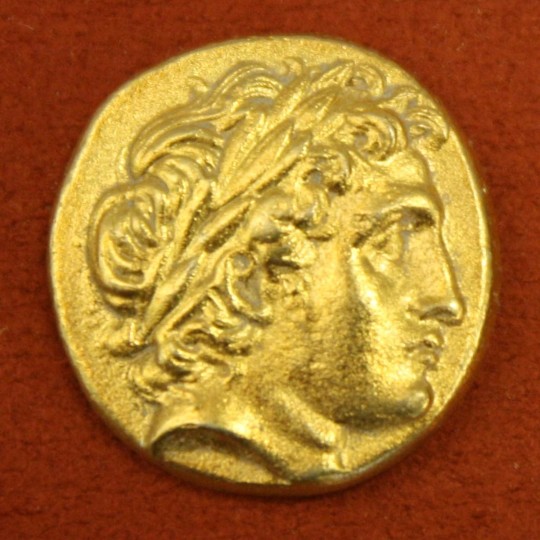
Macedon was an ancient kingdom located in the north of the Greek peninsula first inhabited by the Mackednoi tribe who, according to Herodotus, were the first to call themselves 'Hellenes' (later applied to all Greeks) and who gave the land their name. The kingdom was founded c. 7th century BCE by Caranus who seems semi-mythical and named after the god Makedon (also given as Makednos, Macedon), a son of Zeus. For centuries, the Mackednoi had little to do with southern Greece and the Greeks considered them barbarians who were useful only for the raw materials their region provided, especially timber for shipbuilding. The Mackednoi, for their part, held the Greeks in equal contempt. During the Persian invasion of 480 BCE, Macedonia was under Persian rule and compelled to provide troops for the invading force. Their participation on the Persian side does not seem to have worsened the poor relations between Macedonia and southern Greece in any way. Following the Greek victory and expulsion of the Persians, Macedon preferred to remain aloof from the rest of Greece and the squabbles and fighting which constantly took place between the Greek city-states and the southern states did the same with Macedon. All of this changed under the rule of King Phillip II (r. 359-336 BCE) who systematically brought the southern Greek city-states under his control. After Philip's assassination in 336 BCE his throne passed to his son, Alexander the Great (r. 336-323 BCE), who would spread Greek culture and civilization across the known world of antiquity. Macedon fell out of favor with southern Greece after the death of Alexander in 323 BCE with many Greeks resenting Macedonian rule and virulent antagonism expressed toward anything even remotely Macedonian. Macedon continued as an autonomous and powerful kingdom until it was annexed by Rome, along with the rest of Greece, c.146 BCE.
44 notes
·
View notes
Text
Winx Club Headcanon: War(s) of Solaria
In my headcanon, Solaria isn’t like it was shown in the original series. It was a war-torn kingdom with a history of vertical and horizontal conflicts between the Solarians and Lunarians. Though, in the present day, the kingdom has recovered significantly, in terms of socioeconomic and politics, the past friction and hatred between Solarians and Lunarians are still present and both people now live in separate places (Solarians in Solaria and Lunarians in Lumenos). The war(s) is what caused Stella’s parents to divorce (because I don’t think the original series explains why they separated). This writing will dive into Cassandra’s conspiracies that caused the long conflict and its effect(s) on the kingdom. Also, I will be referring to some ancient Greek/Roman/Babylonian history in terms of the culture, society, and politics of Solaria.
************************************************************************
In the year 668 of the Solarian calendar (The Solarian Calendar draws inspiration from the lunisolar calendar of Ancient Macedonia), Prince Radius of Solaria married Princess Luna of Lumenos, and both became the new King and Queen of Solaria and the first rulers to unite the two people in the planet, the Solarians and Lunarians. Both earned the title “Sun God Shamash” and “Moon Goddess Yarikh” by both people.
In the year 670, two years after their marriage, their first and only daughter was born. They named her Stella—blessed with the title “Ishtar” (meaning Evening Star). She grew up to be a talented, genius young princess and has a natural affinity for magic. Young Princess Stella would soon create her derivation of light magic, drawing sources from both of her parents’ inherited magic (sun and moon magic), Star Magic was born. Princess Stella quickly became the strongest candidate for the Solarian throne due to her brilliance.
This news was a sign of fortune for the Kingdom of Solaria, but for others, it was a threat. Enters Countess Cassandra, a member of the Royal Court of Solaria and Duchess of Sh’va (pronounced “shee-ba”)—one of the regions in Solaria, she was one of the most respected members of the high council and the most influential. This news upset the countess, she had an ambition to take over the kingdom and made herself queen. But King Radius’ success in uniting the Solarians and Lunarians through inter-cultural marriage and the positive perceptions of the royal council and the public regarding Stella, only minimizes the chances of her coup d’etat plan (to be honest I based Cassandra off of Agrippina The Younger, and her conspiracy to dethrone and assassinate Emperor Claudius and made Nero—her son—emperor of Rome. Just like Cassandra who desires her daughter, Chimera, to be the Princess of Solaria)
So, in the year 682, Cassandra’s conspiracy starts its first move. By abusing her power at the Royal Court, Cassandra launches several “campaigns” in the grassroots community of Solaria and uses the “divide and conquer” tactics because what’s a better way to destroy a multicultural society than to divide them and put them onto each others’ throats? Cassandra sent several mercenaries to attack the Solarian community near Sh’va. These mercenaries wear Lunarians’ traditional clothing and a cloak with Lumenos symbols on it. The injured civilians believed that the Lunarians had attacked them, sparking rages all over the region, and within days, Sh’va became a war zone between the Solarians and Lunarians who lived there. Cassandra took this advantage to send spies into the other regions, these spies acted as provocateurs and also informants to Cassandra. Within a couple of months, chaos spread all over Solaria, civil unrest was inevitable and the streets turned into a pool of blood. The Royal Court informed Radius and Luna about this and demanded them to take immediate action.
The Royal Court, comprised of both Solarian and Lunarian descents started to blame each other for the war. However, the Solarians believed that the Lunarians were the ones who started the conflict by pointing weapons at them first. This argumentation and conflicts occurred both horizontally (between civilians) and vertically (between the members of the Royal Court), prompting the King and Queen to act.
The situation worsened when the Solarian High Council pushed King Radius to launch an attack at a possible Lunarian rebels' hideout, located in a region called Enzu. Radius complied believing that it was their hideout ended up killing roughly one hundred Lunarian civilians. His action enraged Luna. Radius commands the army without discussing it with his wife first or even confirming that there were no civilians in that region, this results in a heated argument between the two. Luna, feeling betrayed and disappointed with the Solarians and Radius, decided to side with her people.
The war continues, and although both King and Queen have stepped in to try to ease the situation, the culmination of all the events happens one night, when an angry Solarian mob storms the Temple of Yarikh and destroys it along with all of its contents including the artifacts, some sacred tablets and the statue of the goddess. Of course, this enraged the Lunarians because the Temple of Yarikh is the sacred place built for Luna, and the Solarians soiled the sacred temple. The Lunarians decided to launch an attack on the Solarians but Luna warned them not to act recklessly because they were easily outnumbered. Instead, Luna suggested that both sides sign a treaty of peace because they are already too many casualties from both sides.
The treaty happened in the year 685. The treaty of peace contained an agreement that both sides must follow: “...the planet of Solaria belongs to the Solarian people and therefore planet Lumenos belongs to the Lunarian people.” Both sides parted ways, and soon after Radius and Luna signed the treaty, they were divorced. There is no point in retaining their marriage after all of this bloodbath. The year 685, marked the end of the lunisolar calendar that was used in Solaria and Lumenos for centuries, both changed their calendars, marking the end of the Year of The Sun and Moon and in Solaria it became year 1 of the new Solarian calendar—also called as the Year of The New Sun while in Lumenos it was called the Year of The New Moon.
Hence, the first step of Cassandra’s conspiracy is complete. She had succeeded in removing Luna from the Royal Family.
After they divorced, Radius was busy rebuilding and revitalizing Solaria. Radius turned into a workaholic and even though he loves his daughter, he has too little time to be with her. Stella, the genius princess, grows up to be a teenager with abandonment issues, she often seeks validation from other people and gets in trouble just to gain her father’s attention. Her relationship with her mother was not better either, Stella has a complicated relationship with her mother, she doesn’t hate her because she “abandons” her family but Stella always feels that there is a gap between her and her mother. To the point that she became scared when she had to face her mother, not because she viewed her as a traitor to her family but because of the past that she kept seeing in her, a time when all of them were still together.
After a few years, Cassandra decided it was time to move on to her second plan—assassinating Stella and dethroning Radius. But there’s a problem, Stella goes to Alfea to study how to become a fairy and it becomes impossible for Cassandra to assassinate her. So, she sticks with her plan to dethrone Radius first, of course, she needs to be more careful this time because Radius is much more cautious.
Luckily for Solaria, it took Cassandra some time to strategize and the evil woman was too comfortable basking in her victory. We’ll see what she has up her sleeves.
23 notes
·
View notes